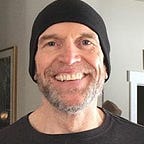Mirror, Mirror, on the Wall…
“If you were to ask the average person in the street about their self, they would most likely describe the individual who inhabits their body. They believe they are more than just their bodies. Their bodies are something their selves control. When we look in the mirror, we regard the body as a vessel we occupy.
“The common notion [is] that our self is an essential entity at the core of our existence that holds steady throughout our life. The ego experiences life as a conscious, thinking person with a unique historical background that defines who he or she is. This is the ‘I’ that looks back in the bathroom mirror and reflects who is the ‘me.’”
The Self Illusion: How the Social Brain Creates Identity, Bruce Hood[1] (2012)
The idea that we are a self riding through life in a body is deeply ingrained in western thinking. Descartes gets most of the credit for it, but its religious and philosophical roots are much more ancient. (The same is true of the eastern, Buddhist idea that there’s no such a thing as a self. We’ll talk origins another time.)
Descartes’ dualism has the curious effect of excusing us from thinking too closely about what we mean by it. It does this by locating the body in the physical, biological, natural world while placing the self in a transcendent realm that parallels the natural world but remains apart from it. The body, along with the rest of the natural world, is the proper subject of scientific inquiry, but the self and its ethereal realm remain inscrutable, the province of faith and metaphor, religion and the humanities. David P. Barash[2] captures the implications of this dichotomy in Through a Glass Brightly: Using Science to See Our Species as We Really Are (2018):
“Science differs from theology and the humanities in that it is made to be improved on and corrected over time… By contrast, few theologians, or fundamentalist religious believers of any stripe, are likely to look kindly on ‘revelations’ that suggest corrections to their sacred texts. In 1768, Baron d’Holbach, a major figure in the French Enlightenment, had great fun with this. In his satire Portable Theology (written under the pen name Abbe Bernier, to hide from the censors), d’Holbach defined Religious Doctrine as ‘what every good Christian must believe or else be burned, be it in this world or the next. The dogmas of the Christian religion are immutable decrees of God, who cannot change His mind except when the Church does.’
“By contrast, science not only is open to improvement and modifications but also is to a large extent defined by this openness. Whereas religious practitioners who deviate from their traditions are liable to be derogated — and sometimes killed — for this apostasy …, science thrives on correction and adjustment, aiming not to enshrine received wisdom and tradition but to move its insights closer to correspondence with reality as found in the natural world.”
Attempts to bridge the realms of body and soul end up in pseudo-science, eventually discredited and often silly. Consider for example the ether (or sometimes “aether”) — a term that since Plato and Aristotle has been applied to both the rarefied air only the gods can breathe and the stuff light moves through in inter-stellar space.[3]
You don’t need to be a poet or or prophet to think the self is inviolate. It’s just so obvious to most of us that there’s a self inside who watches and knows all about us — who in fact is us. We experience it as that never-silent internal voice — observing and commenting, often critiquing, sometimes shaming — that always seems to be accurate. We’ve been hearing it for as long as we can remember: it’s embedded in our brain’s memory banks, all the way back to when we first started remembering things and using language to describe and record them.
We have always been aware that we are aware:
we don’t just observe, we observe ourselves observing.
Hence the belief that we are body and soul seems not worth challenging. Which is why, in keeping with this blog’s purpose, we’re going to do precisely that.
Cartesian dualism is foundational to self-awareness and to our cultural beliefs and institutions. It guides everything from religious faith to criminal culpability, health and wellbeing to mental illness. And so much more. As a result, taking a closer look will not only challenge our perceptions of what it real, it will shake reality itself. This inquiry won’t be easy. Again from The Self Illusion:
“Understanding that the self could be an illusion is really difficult… Our self seems so convincing, so real to us. But then again, many aspects of our experience are not what they seem.
“Psychologist Susan Blackmore makes the point that the word ‘illusion’ does not mean that it does not exist — rather an illusion is not what it seems. We all certainly experience some form of self, but what we experience is a powerful deception generated by our brains for our own benefit.”
That’s where we going. Hang tight.
[1] Bruce Hood is an experimental psychologist at the University of Bristol. He specializes in developmental cognitive neuroscience.
[2] David P. Barash is an evolutionary biologist and professor of psychology emeritus at the University of Washington.
[3] For a useful primer, see The Eternal Quest for Aether, the Cosmic Stuff That Never Was, Popular Mechanics (Oct 19, 2018).
Originally published at http://iconoclast.blog on August 9, 2019.
